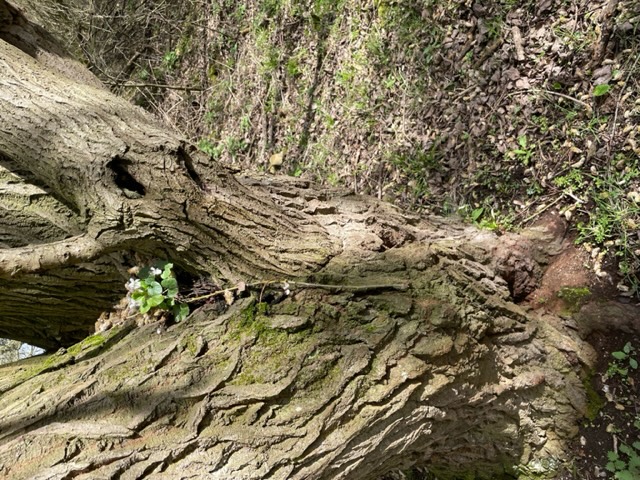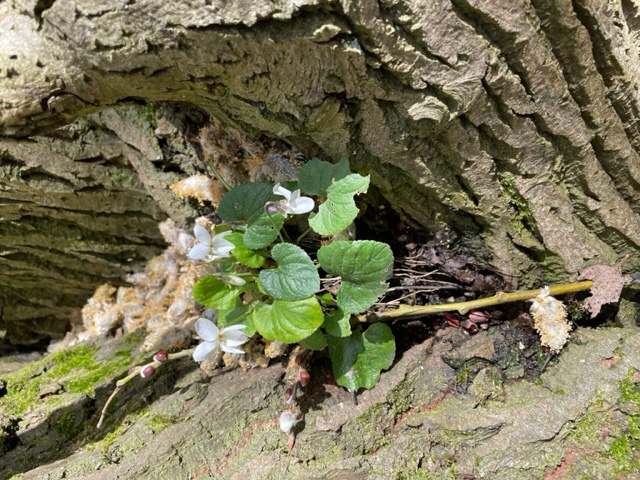Excellent epiphytes!
- Crone

- Apr 13, 2023
- 3 min read
White violets in a willow! How wonderful!
These photos were sent by Ian Hilbert - and Claire had seen the violet first.
I have only seen elder and a laurel growing in trees, so this was such a delight.
They were at special Sulehay.
I am currently reading two tree books. Colin Tudge's The Secret Life of Trees and Claus Mattheck's The Body Language of Trees. The former has an introduction so good that I took the book to the hospital and read it aloud to Dad. Tudge says people must care, must love, if they are to conserve. It's not just a matter of science and of knowing. Too right!
I was going to simply link to a review of The Secret Life of Trees, but I feel I must quote some of what Adam Thorpe wrote in The Guardian:
I recently met a leading atmospheric physicist researching into global warming, who told me that catastrophe was indeed imminent but we still had enough time to save the world: a few decades, maybe. Even a minor effort - better house insulation, a tax on air fuel, restricting 4x4s and so on - might dilute the devastation, he suggested. We are only talking about some 50 years, by which time the looming exhaustion of fossil fuels would remove political power from the oil companies and force us to find forms of energy that do not bring massive species-extinction in their wake. Aside from those infantile millions among the Christian right who positively crave the Final Day, the real puzzle is why we can't stop playing this endgame - or why we put up so patiently with leaders benefiting directly from it. The answer occurred to me halfway through Colin Tudge's The Secret Life of Trees: in the planet's terms, we have become stupid. Our heads (even if entirely free of celebrity gossip) are no longer filled with useful, earth-based knowledge. In this country, "citizenship" (according to the Home Office test) involves an ability to date our national days, not to identify the most common of the paltry 39 species of native tree that even the most urban of us live among. An indigenous forest-dweller or an observant pre-industrial peasant farmer is, in this sense, arguably brighter than we are. The Secret Life of Trees reminds us just what we spend our lives not knowing, and all of it is not only wondrous and important but entirely free.
An average temperate wood - let alone an equatorial forest - is a miracle of complexity that sustains itself as much through "dialogue" as competition. Tudge maintains that, in the natural world, "each individual must take everything else into account" in order to survive, finding "a limited number of solutions" to the particular problems they are faced with. The lineage of plants has reinvented, over and over again, the form of the tree. It is an "optimal solution", though manifest in tens of thousands of fabulously different ways.
The book is great - there are so many darn trees....
As for The Body Language of Trees, that was recommended by a man whom I thought was speaking my language when I said that a tree is a vision of time lived in one place made manifest in wood. i thought the book would be kind of... well, woo-woo. It's not - but it is fabulous. A hedgehog called Stupsi explains the mechanical factors that make trees the shapes they are, how they fracture and how they recover. I found a rather cool video that gets some of this across!
Talking of woo-woo, anyone who'd watched Wild Isles, David Attenborough's series on British wildlife, will surely note that when he speaks of an ancient oak, he speaks of the tree as he might speak of a friend... "I have known this tree for seventy years." To know a tree for seventy years. That is an ambition worth having.







Good point about not having anywhere near enough "earth based knowledge".